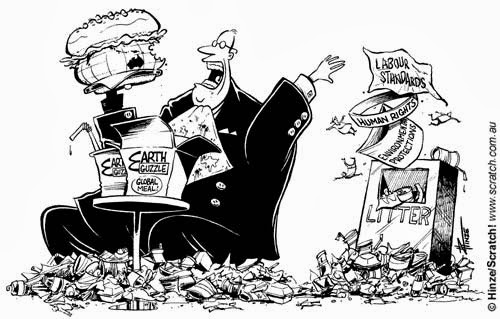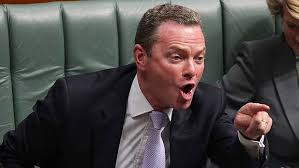Here we Joh again! Leopard Newman removes Queenslanders' rights to object to mines

Just as Queensland considers some of the biggest mining
proposals in its history, a midnight amendment has taken away community
rights to object, right after promising the opposite. Stephen Keim SC and Alex McKean report.
AFTER QUEENSLAND PREMIER Campbell Newman’s Government suffered a second stunning by-election defeat in late July in the electorate of Stafford, he apologised to the voters, promised again to listen more and even said he would rectify some of the worst legislative acts of his recent past.
Premier Newman effectively promised that the spots which adorned him
and his government, and with which voters had become much too familiar,
would be changed beyond recognition.
Subsequent events have shown that nothing has changed.
The Newman Government has a track record where donations to the
Liberal National Party have been closely followed by Government actions
favouring the donor. Not so mysteriously, this convergence of interest has often involved mining interests as the beneficiary donor.
The latest event, however, takes the subversion of Parliamentary
process to a new and bewildering level. Premier Newman’s Government has
used the minutes before midnight to force unheralded amendments through
the Parliament to make the already undemocratic legislation far worse.
And who benefits? The proponents of huge mining developments.
The Mineral and Energy Resources (Common Provisions) Bill 2014 (Qld) was introduced into the Parliament by the Minister for Mines, Andrew Cripps, in June 2014 — about six weeks before Newman’s famous promise to be better.
From the beginning of the ‘consultation process’, it was clear that the Bill would remove a large swathe of existing rights to object to mining proposals and to pursue those objections through a quasi-judicial process in the Land Court.
There was, however, one saving grace.
Objection rights would be retained with regard to the biggest and
ugliest mining proposals — the so-called site specific applications.
The explanatory notes to the Bill promised that it would retain the
‘… right to lodge a submission, under the Environmental
Protection Act 1994 for site-specific application environmental
authorities for higher impact and intensive activities.’
The Bill was referred to the Agriculture, Resources and Environment Committee. The Committee received an astonishing 288 submissions about the Bill from a broad range of interested parties.
On 5 September 2014, the Committee delivered its Report on
the Bill. The documents suggest that, for the Government members on the
Committee, the content of the Report was results, as opposed to
evidence, driven.
By way of example, the Report contained an approving reference to the claim by the Queensland Resources Council that
‘… there was evidence to suggest that public objection processes in some cases were being abused to delay projects.’
There were, of course, competing submissions from impeccable sources ‒
including Queensland Government departments ‒ to rebut the Resources
Council claim.
The Land Court stated
that, in its experience, there was no evidence to suggest the court’s
processes were being used to delay project approvals.
In a similar vein, the Department of Environment and Heritage Protection stated that there was little evidence to support the claims of the Queensland Resources Council.
Of the competing views of reality, the Government members chose the
unsubstantiated claims of the Resources Council and supported the Bill
in its already objectionable form.
Worse was to come, however — although Andrew Cripps, the minister,
was using his most soothing tones to point in a direction far from where
the even greater danger lay in wait.
Mines Minister Cripps began the debate on the second reading of the Bill late in the afternoon of Tuesday 9 September 2014.
In his speech, he repeated and confirmed the previous assurances in the following terms:
“EAs for proposed mines which may have environmental impacts on
people some distance from a proposed mine, such as coal mines, will
always be publicly notified, so anyone, including landholders, local
councils, adjoining landholders and the community can lodge a submission
about a site specific application for an EA on environmental grounds.”
Clearly nothing to worry about, then!
As the night wore on, Minister Cripps, on a number of occasions,
repeated, without qualification, that “anyone” would still have an
opportunity to
“… object to an application for an environmental authority
associated with a mining lease where that EA is going to be site
specific.”
Then, at five minutes to midnight, the leopard revealed its old familiar spots.
Minister Cripps moved the amendment removing the right of anyone to
object to an environmental authority for a mining project where the
Coordinator-General is satisfied the environmental effects have been
adequately addressed.
Site specific environmental authorities were no longer sacred.
The Coordinator-General now has the power for the highest impact
mining proposals, those that are coordinated projects, to remove the
scrutiny of the Land Court for environmental authorities. All those
assurances, from the explanatory memorandum, the second reading speech
and, repeatedly, from the Minister’s own mouth, flew together out the
Parliamentary windows.
The nasty reality they were hiding was revealed.
After all those assurances, objection rights would not be preserved for the largest and most potentially damaging mining projects.
Procedural subterfuge is nearly always accompanied by substantive
disgrace, because Governments proud of their legislative reforms are
usually happy to debate them up hill and down dale and in the clear
light of day.
And there is reason to believe that this particular set of changes
strikes deeply into the vital organs of our still (but barely) breathing
democracy.
No less an authority than the New South Wales Independent Commission Against Corruption identifies community involvement in planning projects, such as the right to object to mining, as one of the six key corruption prevention measures.
In a recent report, ICAC noted:
‘Community participation and consultation requirements also act
as a counter balance to corrupt influences. The erosion of these
requirements in the planning system reduces scrutiny of planning
decisions and makes it easier to facilitate a corrupt decision.’
Queensland’s analogous agency, the Crime and Corruption Commission,
did not make a submission to the Committee concerning this Bill.
The ability of Queensland’s anti-corruption agency to display the necessary independence has been thrown into great doubt by the appointment of a seemingly perennial acting chair, Dr Ken Levy, cuts to its funding and various other structural changes including having its research role restricted to those areas approved by the Attorney-General.
So, what were some of the precursors to this removal of community
rights to participate in decisions about future land use and natural
resource extraction?
Sibelco, a Belgian mining giant, made undisclosed donations
of $90,000, which were used to fund a bogus letter-writing campaign in
Mr Newman’s electorate of Ashgrove prior to the 2012 election.
After the election, a series of meetings took place between Sibelco
executives and Government representatives, culminating in the Newman
Government passing legislation which will allow Sibelco, in 2019 ‒ if the legislation is not repealed before the lease options are exercised ‒ to extend its sand mining leases on Stradbroke Island until 2035.
The extensions will increase Sibelco’s net worth by $1.5 billion.
Meanwhile, a company, Karreman Quarries, had made a donation of $75,000
to the LNP. Subsequently, an amendment was quietly snuck into a Bill
which dealt with other matters. The amendment, when it became law, after
being hurried through the Parliament by Premier Newman’s parliamentary
troops, saved Karremans from having to face criminal prosecution in the
Courts.
The amendment declared Karreman’s quarrying activities, then under investigation, to be legal and
‘… to always have been legal.’
The Deputy Premier, Jeff Seeney, appears to have been influential in negotiating the very favourable legislative treatment.
By stripping away rights of the community to object to mining
projects, Premier Newman has chosen to benefit big mining interests at
the expense of traditional National Party supporters, Queensland’s
farmers and graziers.
The reality is echoed by the language.
The highly respected rural lobby group, AgForce, one of the stakeholders who objected
to the Bill, found itself pilloried by Minister Cripps in his speech in
the second reading debate, along with all the other adverse submitters,
as being ‒ absurdly ‒ among the “radical greenie groups” who opposed the legislation.
The midnight destruction of community objection rights is significant
in its timing. The Queensland polity faces important decisions about
mining proposals for mines of a scale rarely, if ever, seen before.
In 2013, Greenpeace published a report
naming the proposed coal mining projects in Queensland’s Galilee Basin
as comprising one of the 14 dirtiest resource proposals in the entire
world. Greenpeace warned that, if all the proposals went ahead, they
would produce a 5-6 degree increase in average global temperature.
Just two of the nine mega-mines proposed for the Galilee Basin will have a combined output four times that of the biggest mine currently operating in Australia.
It could readily have been anticipated by Newman and Cripps that the
community would have concerns about coal mining on such a massive scale.
The concern would be aggravated by the associated proposals to build
rail and port facilities to take the coal to China and India. The
community would, no doubt, have concerns about the massive contribution
the burning of that coal would make to catastrophic climate change, as
well as the likely increase in deaths due to air pollution, which
already number in the hundreds of thousands every year.
But Minister Cripps’ midnight amendment gave the most powerful public servant in Queensland, the Coordinator General,
more power to remove the Land Court’s ability to scrutinise matters of
concern raised by the community about these massive mining projects in
the Galilee Basin and, indeed, anywhere else.
Ironically, back in December 2012, the then Crime and Misconduct Commission published a report on political donations
in Queensland. That report concluded that Queensland had some of the
most stringent electoral donation laws, including the lowest caps on
reportable donations, in the country.
Newman’s Government also reversed that position, legislating to reduce transparency and accountability around political donations in Queensland, thereby creating conditions conducive to corruption.
The spurious justification
for the increase in non-reportable donations ‒ from $1,000 to $12,400
for individual donations ‒ was that Queensland had to be brought into
line with the Commonwealth donation limits. No other State of Territory
has felt the need for such a move and Queensland now shares the highest
reportable threshold of any jurisdiction.
In the wake of these changes,
the public may never know whether or how much the mining interests who
stand to benefit from the midnight amendment donated to the LNP either
before or after the changes.
But one thing is clear, Campbell Newman, whose government moved and
passed the midnight amendment, is the same Mr. Newman against whom the
people of Redcliffe and Stafford voted in such large numbers.
Those old familiar spots are in plain view. For all to see.
A much abridged version of this article appeared in The Australian on 25 September 2014.

This work is licensed under a Creative Commons Attribution-NonCommercial-NoDerivs 3.0 Australia License










